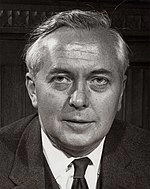How to Pronounce Harold Wilson
#50
Most Popular
Boost
Mar 11, 1916 Huddersfield, England, United Kingdom Died on 24 May 1995 (aged 79)
former Prime Minister of the United Kingdom
PiscesHarold Wilson, Date of Birth, Place of Birth, Family, Facts, Age, Net Worth, Biography and More in FamedBorn.com

former Prime Minister of the United Kingdom
Pisces